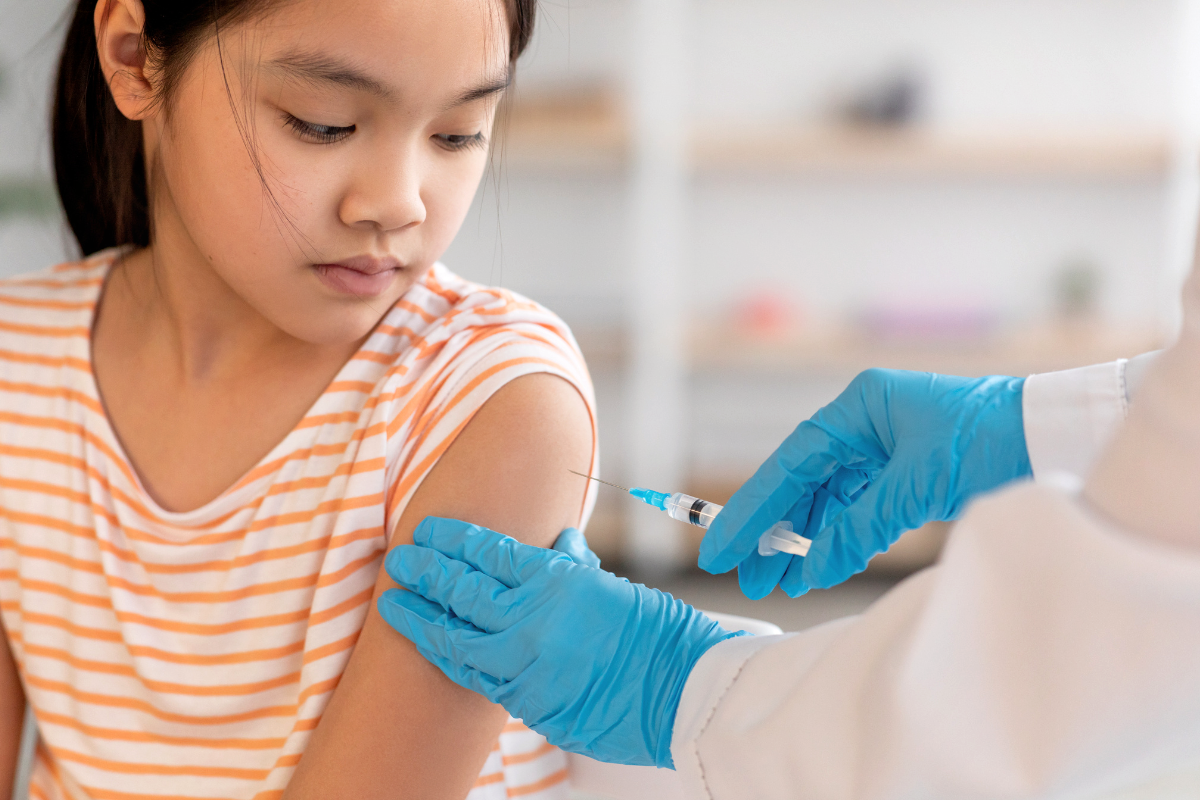I want to help break down some hard-to-follow updates on vaccine recommendations this week.
The Advisory Committee on Immunization Practices (ACIP) met on September 18 and 19 to discuss its stance on three vaccines for kids: MMRV, hepatitis B, and COVID. This committee is responsible for developing CDC guidance around vaccinations, and Robert F. Kennedy, Jr. recently replaced all of its members with individuals who have historically been skeptical of vaccines.
Below: a rundown of what was discussed at these meetings, and what it means for vaccines right now. I do want to note this is an evolving area — insurers and state policymakers have started to indicate they may move away from the ACIP recommendations, and there is increasing concern from Congress about these issues.

MMRV Vaccine
The first topic was the vaccine for measles, mumps, rubella, and varicella (chickenpox), also known as MMRV. This is a combination vaccine, initially approved in 2005, that includes all four vaccines in a single shot. It is not to be confused with the MMR vaccine.
The MMRV vaccine is not widely used. By 2008, surveillance data had made clear that fever and febrile seizures were more likely with the MMRV vaccine than when the MMR vaccine and the varicella vaccine were given separately at the same visit. This increase was notable, but the numbers are small — 9 per 10,000 shots among those getting the MMRV vaccine, versus 4 in 10,000 for those getting the MMR and varicella vaccines separately.
At that point, the MMRV vaccine remained available because febrile seizures are generally not harmful, even if they are scary for parents; however, it’s typically only given when parents request it.
At the ACIP meeting, the committee discussed the relationship between the MMRV vaccine and febrile seizures — the same issues discussed above, which were already noted in 2008. The committee voted on a proposal to change the vaccine schedule to indicate that the MMRV vaccine “is not recommended” for children under the age of four. Instead, children should get the MMR and varicella vaccines separately for their first vaccine. This is a change from the current situation, which says that separate vaccines are preferred, but both are recommended.
The committee was split on this, but ultimately voted to approve the change to the language. The end of this vote was, I will note, confusing. In the end, after a second vote, the committee voted to make this change apply to both the overall recommendations and the recommendation that is relevant for a vaccine program that serves low-income kids.
Practically, the immediate changes here are not relevant for most people — the vast majority of children get the MMR vaccine and the varicella vaccine separately anyway, especially for the first dose, which is what this is relevant for.
Decision: The MMRV vaccine will not be recommended for children under four, and it will not be covered by the Vaccines for Children (VFC) Program. This decision is unrelated to the MMR vaccine.
Hepatitis B Vaccine
Next, they discussed the hepatitis B vaccine and whether it should be universally given at birth.
Hepatitis B is a significant cause of liver cancer and liver failure. It’s much more serious if it is acquired early in life, since at that stage, infection is very likely to lead to becoming a carrier.
Transmission from mother to child is very likely if the mother is a hepatitis B carrier and the infant is not vaccinated. This is why hepatitis B vaccines are given at birth; this policy of universal vaccination at birth has proved highly effective at reducing hepatitis B rates.
The question that ACIP had on the table: if a woman has tested negative for hepatitis B, should the first hepatitis B dose to her baby be delayed to 4 weeks, rather than given at birth?
There was considerable discussion of this decision. On the one hand, many other countries do not give this vaccine at birth to women who are negative for hepatitis B. On the other hand, there is no reason to make this change. The committee wasn’t reacting to any safety signal or anything else, so it’s unclear why this would be changed.
In the end, the committee voted to… not vote. They tabled the motion after a long discussion. They suggested a follow-up later, but there were no details about what that would look like. For now, the result is that there is no change to the recommendation about the hepatitis B vaccine.
The committee did vote to test all women for hepatitis B during pregnancy. Already close to 90% of women are tested during pregnancy; this change is largely irrelevant.
Decision: The committee decided not to vote. No changes were made to the ACIP recommendations to give the hepatitis B vaccine at birth.
COVID-19
Finally, ACIP discussed COVID-19 vaccines. There has already been a lot of movement on COVID-19, since the FDA limited approval of boosters to older individuals, those with underlying conditions, and children under 18. Many pharmacies have paused carrying vaccines, partly due to a concern that ACIP might further limit recommendations.
The committee spent an entire day discussing COVID-19 vaccines. The core discussion surrounded both efficacy and safety, and there was a tremendous amount of disagreement within the committee. There are a number of committee members who have been vocal opponents of COVID-19 vaccines, and others who support their use.
In the end, the committee voted in favor of COVID-19 vaccines for individuals over 65 “with shared clinical decision making,” and for individuals 6 months to 64 years of age, also with shared decision making. They included some language for the latter group to suggest that this discussion should emphasize that some groups are at a higher risk for COVID-19 than others. “Shared clinical decision-making” is not precisely defined; generally, it means that the decision should be made at an individual level.
To be clear: the language does not require a doctor or pharmacist’s approval — it just suggests that there should be a discussion. This is a change from prior language of the vaccine being “recommended”, but the actual impact of these changes is limited. Both the past and current language should allow access to and coverage of COVID-19 vaccines for people who want them, provided they are in the FDA approval groups.
There was an additional vote. There was a proposal to encourage states and local jurisdictions to require a prescription for the COVID-19 vaccine. The details of this are complex — they seemed unclear to even some of the committee members — but the bottom line is this would have greatly limited COVID-19 vaccine access because it would have made it difficult for many pharmacists to give the vaccine. In the end, the vote on this was tied, and the committee chair was the decider. He voted no, so this did not pass. This was probably the most important decision in the meeting.
Decision: COVID-19 vaccines are no longer “recommended” by ACIP; instead, they are approved, but decisions should be made at an individual level. The committee did not pass the proposal to suggest that states require prescriptions for COVID-19 vaccines.
Closing thoughts
This meeting was extremely chaotic. Unlike past meetings, the votes were not presented to the committee in advance, so people were confused about what they were voting on. One of the votes on the first day (the second of the MMRV votes) was so confusing it had to be repeated on day 2. On the final vote, the Zoom from the room cut out, leaving the YouTube stream with only the individuals who were not there in person, just chatting. It was unusual.
There were no consequential decisions made, which is the important practical takeaway. It remains to be seen what will happen in the future.
Community Guidelines















Log in
Thank you for breaking this down. The general media coverage of this meeting made it sound like dramatic changes were made. In reading your analysis, I feel much better about the state of vaccines (for now). I find it incredibly worrying that so much of the change proposed really just impacts low-income families. This feels like an attack on people who already have it hard enough. Thank you for being a clear head in a storm!!
This is strangely telling of the committee… “On the final vote, the Zoom from the room cut out, leaving the YouTube stream with only the individuals who were not there in person, just chatting. It was unusual.”
Whew. Thank you for the rundown!
What does this mean for COVID vaccine coverage? If ACIP doesn’t recommend something, it usually means payors won’t pay. Is this the case with COVID vaccines?
Check if your health insurance company is a member of AHIP – that group has committed to covering vaccines recommended by ACIP as of 9/1/25 through the end of 2026. https://www.fiercehealthcare.com/payers/major-health-insurance-group-maintains-commitment-vaccine-coverage-ease-patient-access?utm_medium=email&utm_source=nl&utm_campaign=HC-NL-FierceHealthcareWeekly&oly_enc_id=5345B0872112C8Z
To add another point, insurance companies recently came out and announced no changes on fall vaccines for another year. Anecdotally, some people have gotten their covid shots paid for like normal, both before and after Friday’s vote. But also some people have run into trouble, likely because their own insurance company is confused because it’s all so (deliberately) confusing.